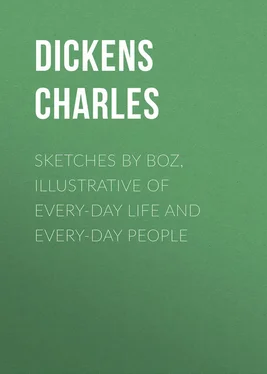Чарльз Диккенс - Sketches by Boz, Illustrative of Every-Day Life and Every-Day People
Здесь есть возможность читать онлайн «Чарльз Диккенс - Sketches by Boz, Illustrative of Every-Day Life and Every-Day People» — ознакомительный отрывок электронной книги совершенно бесплатно, а после прочтения отрывка купить полную версию. В некоторых случаях можно слушать аудио, скачать через торрент в формате fb2 и присутствует краткое содержание. Жанр: foreign_antique, foreign_prose, на английском языке. Описание произведения, (предисловие) а так же отзывы посетителей доступны на портале библиотеки ЛибКат.
- Название:Sketches by Boz, Illustrative of Every-Day Life and Every-Day People
- Автор:
- Жанр:
- Год:неизвестен
- ISBN:нет данных
- Рейтинг книги:3 / 5. Голосов: 1
-
Избранное:Добавить в избранное
- Отзывы:
-
Ваша оценка:
- 60
- 1
- 2
- 3
- 4
- 5
Sketches by Boz, Illustrative of Every-Day Life and Every-Day People: краткое содержание, описание и аннотация
Предлагаем к чтению аннотацию, описание, краткое содержание или предисловие (зависит от того, что написал сам автор книги «Sketches by Boz, Illustrative of Every-Day Life and Every-Day People»). Если вы не нашли необходимую информацию о книге — напишите в комментариях, мы постараемся отыскать её.
Sketches by Boz, Illustrative of Every-Day Life and Every-Day People — читать онлайн ознакомительный отрывок
Ниже представлен текст книги, разбитый по страницам. Система сохранения места последней прочитанной страницы, позволяет с удобством читать онлайн бесплатно книгу «Sketches by Boz, Illustrative of Every-Day Life and Every-Day People», без необходимости каждый раз заново искать на чём Вы остановились. Поставьте закладку, и сможете в любой момент перейти на страницу, на которой закончили чтение.
Интервал:
Закладка:
The tobacconist remained in possession longer than any tenant within our recollection. He was a red-faced, impudent, good-for-nothing dog, evidently accustomed to take things as they came, and to make the best of a bad job. He sold as many cigars as he could, and smoked the rest. He occupied the shop as long as he could make peace with the landlord, and when he could no longer live in quiet, he very coolly locked the door, and bolted himself. From this period, the two little dens have undergone innumerable changes. The tobacconist was succeeded by a theatrical hair-dresser, who ornamented the window with a great variety of ‘characters,’ and terrific combats. The bonnet-shape maker gave place to a greengrocer, and the histrionic barber was succeeded, in his turn, by a tailor. So numerous have been the changes, that we have of late done little more than mark the peculiar but certain indications of a house being poorly inhabited. It has been progressing by almost imperceptible degrees. The occupiers of the shops have gradually given up room after room, until they have only reserved the little parlour for themselves. First there appeared a brass plate on the private door, with ‘Ladies’ School’ legibly engraved thereon; shortly afterwards we observed a second brass plate, then a bell, and then another bell.
When we paused in front of our old friend, and observed these signs of poverty, which are not to be mistaken, we thought as we turned away, that the house had attained its lowest pitch of degradation. We were wrong. When we last passed it, a ‘dairy’ was established in the area, and a party of melancholy-looking fowls were amusing themselves by running in at the front door, and out at the back one.
CHAPTER IV – SCOTLAND-YARD
Scotland-yard is a small – a very small-tract of land, bounded on one side by the river Thames, on the other by the gardens of Northumberland House: abutting at one end on the bottom of Northumberland-street, at the other on the back of Whitehall-place. When this territory was first accidentally discovered by a country gentleman who lost his way in the Strand, some years ago, the original settlers were found to be a tailor, a publican, two eating-house keepers, and a fruit-pie maker; and it was also found to contain a race of strong and bulky men, who repaired to the wharfs in Scotland-yard regularly every morning, about five or six o’clock, to fill heavy waggons with coal, with which they proceeded to distant places up the country, and supplied the inhabitants with fuel. When they had emptied their waggons, they again returned for a fresh supply; and this trade was continued throughout the year.
As the settlers derived their subsistence from ministering to the wants of these primitive traders, the articles exposed for sale, and the places where they were sold, bore strong outward marks of being expressly adapted to their tastes and wishes. The tailor displayed in his window a Lilliputian pair of leather gaiters, and a diminutive round frock, while each doorpost was appropriately garnished with a model of a coal-sack. The two eating-house keepers exhibited joints of a magnitude, and puddings of a solidity, which coalheavers alone could appreciate; and the fruit-pie maker displayed on his well-scrubbed window-board large white compositions of flour and dripping, ornamented with pink stains, giving rich promise of the fruit within, which made their huge mouths water, as they lingered past.
But the choicest spot in all Scotland-yard was the old public-house in the corner. Here, in a dark wainscoted-room of ancient appearance, cheered by the glow of a mighty fire, and decorated with an enormous clock, whereof the face was white, and the figures black, sat the lusty coalheavers, quaffing large draughts of Barclay’s best, and puffing forth volumes of smoke, which wreathed heavily above their heads, and involved the room in a thick dark cloud. From this apartment might their voices be heard on a winter’s night, penetrating to the very bank of the river, as they shouted out some sturdy chorus, or roared forth the burden of a popular song; dwelling upon the last few words with a strength and length of emphasis which made the very roof tremble above them.
Here, too, would they tell old legends of what the Thames was in ancient times, when the Patent Shot Manufactory wasn’t built, and Waterloo-bridge had never been thought of; and then they would shake their heads with portentous looks, to the deep edification of the rising generation of heavers, who crowded round them, and wondered where all this would end; whereat the tailor would take his pipe solemnly from his mouth, and say, how that he hoped it might end well, but he very much doubted whether it would or not, and couldn’t rightly tell what to make of it – a mysterious expression of opinion, delivered with a semi-prophetic air, which never failed to elicit the fullest concurrence of the assembled company; and so they would go on drinking and wondering till ten o’clock came, and with it the tailor’s wife to fetch him home, when the little party broke up, to meet again in the same room, and say and do precisely the same things, on the following evening at the same hour.
About this time the barges that came up the river began to bring vague rumours to Scotland-yard of somebody in the city having been heard to say, that the Lord Mayor had threatened in so many words to pull down the old London-bridge, and build up a new one. At first these rumours were disregarded as idle tales, wholly destitute of foundation, for nobody in Scotland-yard doubted that if the Lord Mayor contemplated any such dark design, he would just be clapped up in the Tower for a week or two, and then killed off for high treason.
By degrees, however, the reports grew stronger, and more frequent, and at last a barge, laden with numerous chaldrons of the best Wallsend, brought up the positive intelligence that several of the arches of the old bridge were stopped, and that preparations were actually in progress for constructing the new one. What an excitement was visible in the old tap-room on that memorable night! Each man looked into his neighbour’s face, pale with alarm and astonishment, and read therein an echo of the sentiments which filled his own breast. The oldest heaver present proved to demonstration, that the moment the piers were removed, all the water in the Thames would run clean off, and leave a dry gully in its place. What was to become of the coal-barges – of the trade of Scotland-yard – of the very existence of its population? The tailor shook his head more sagely than usual, and grimly pointing to a knife on the table, bid them wait and see what happened. He said nothing – not he; but if the Lord Mayor didn’t fall a victim to popular indignation, why he would be rather astonished; that was all.
They did wait; barge after barge arrived, and still no tidings of the assassination of the Lord Mayor. The first stone was laid: it was done by a Duke – the King’s brother. Years passed away, and the bridge was opened by the King himself. In course of time, the piers were removed; and when the people in Scotland-yard got up next morning in the confident expectation of being able to step over to Pedlar’s Acre without wetting the soles of their shoes, they found to their unspeakable astonishment that the water was just where it used to be.
A result so different from that which they had anticipated from this first improvement, produced its full effect upon the inhabitants of Scotland-yard. One of the eating-house keepers began to court public opinion, and to look for customers among a new class of people. He covered his little dining-tables with white cloths, and got a painter’s apprentice to inscribe something about hot joints from twelve to two, in one of the little panes of his shop-window. Improvement began to march with rapid strides to the very threshold of Scotland-yard. A new market sprung up at Hungerford, and the Police Commissioners established their office in Whitehall-place. The traffic in Scotland-yard increased; fresh Members were added to the House of Commons, the Metropolitan Representatives found it a near cut, and many other foot passengers followed their example.
Читать дальшеИнтервал:
Закладка:
Похожие книги на «Sketches by Boz, Illustrative of Every-Day Life and Every-Day People»
Представляем Вашему вниманию похожие книги на «Sketches by Boz, Illustrative of Every-Day Life and Every-Day People» списком для выбора. Мы отобрали схожую по названию и смыслу литературу в надежде предоставить читателям больше вариантов отыскать новые, интересные, ещё непрочитанные произведения.
Обсуждение, отзывы о книге «Sketches by Boz, Illustrative of Every-Day Life and Every-Day People» и просто собственные мнения читателей. Оставьте ваши комментарии, напишите, что Вы думаете о произведении, его смысле или главных героях. Укажите что конкретно понравилось, а что нет, и почему Вы так считаете.












